US Econews radio shows hosts Asim Mollazade
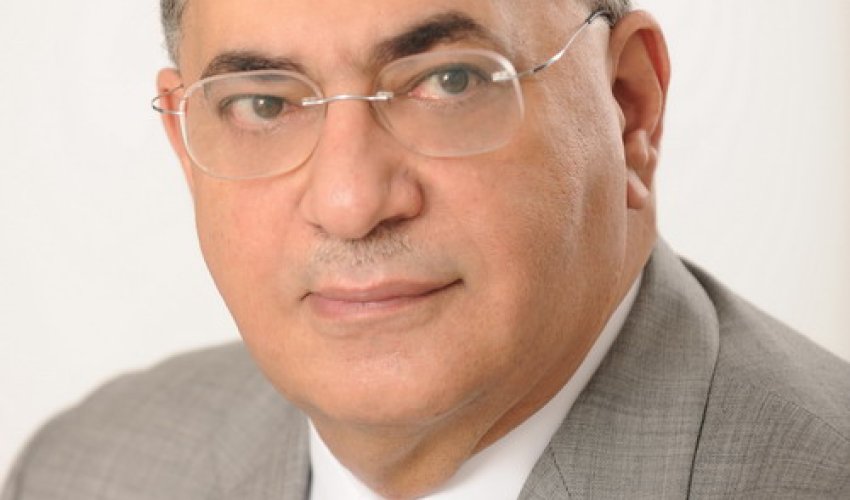
Educational Communications and the station present "Environmental Directions” with Nancy Pearlman. Under this series, we explore the effects of human influence on the earth’s ecosystems and discuss solutions to environmental problems which affect the quality of life on this planet. "Environmental Directions” give you the kind of information you need to help participate in decisions impacting your community, the nation and the world. Now, your show host, Nancy Pearlman.
- Hello. My guest is Dr. Asim Mollazade. He is a medical doctor, chairman of the Democratic Reforms Party of Azerbaijan, founder and president of the Euro-Atlantic Center of Azerbaijan, and also a member of Azerbaijani Majlis, which is their parliament or Congress. Welcome. It’s a pleasure to have you with us.
- Thank you very much.
- Azerbaijan is a beautiful multicultural country with many different kinds of environments. It’s on the Caspian Sea. How would you describe its unique situation and place as a Eurasian country?
- Azerbaijan is a country which historically is named "Land of Fire”. First world oil extraction was in Azerbaijan. We started oil industry in 1847 before the United States of America had its first oil drilling in 1858 in Pennsylvania. The oil and gas factor has become a really important factor for Azerbaijan and its development. With the help of the United States, we could construct pipelines connecting the Caspian Sea with the Mediterranean Sea via Turkey and Georgia. We are now playing a very important role in the energy security of Europe and the world. It is especially important for us, because Azerbaijan has a chance now to deliver oil to Israel, our ally in Middle East.
- Doesn’t Israel import about half of its oil from Azerbaijan?
- No, we have more oil than Israel needs, but at the same time, this oil is a security guarantee for the very important US ally in region. Also other US allies, European Union countries are receiving oil and gas from Azerbaijan. And in this situation, we are breaking the monopoly of some countries keeping to blackmail Europe with their energy.
- And what is interesting is that Israel is considered a Jewish state and Azerbaijan is a secular Muslim state and they are working together.
- We are working together because behind this story is a long period of brotherhood. We lived together thousands of years, suffering from many problems when big empires fighting each other and small nations suffering from that. In Azerbaijan, the Jewish community has a history of more than two thousand years. After the pogroms in Europe in the 19th and 2oths centuries, Ashkenazi Jews came to Azerbaijan. They lived in peace and brotherhood in Azerbaijan. That’s why maybe the bridge between Azerbaijan and Israel is based on concrete persons, concrete families and concrete friendships with a history of many, many years.
- When I visited Azerbaijan, I was amazed at your efforts as a country, a government to preserve, protect so many of the national monuments and historical building including 1,000-year-old churches and even the Zoroastrian temple.
- Yes. At the same time, we think that one of the important strategies for Azerbaijan is to make Azerbaijan a center of multiculturalism. We are proud that one of the greatest persons of the 20th century, John Paul II, gave us a beautiful, modern Catholic church as a present. But was a third Catholic church in Azerbaijan. We have a small Catholic community. Most of them are Polish and Irish. We are proud that there are Christian churches, such as Evangelist churches, in our capital. Historically, we also had a big German community in Azerbaijan. We have a Russian Orthodox church and the Azerbaijani state renovated all of them. Azerbaijan, as a secular state, does not have a dominance of some religions. We are a secular state. There is a separation of state, politics and religion in our country. At the same time, the state is trying to support different religious groups. This is making us multicolored. This is making us much stronger and smarter. All these Catholics, Jews who live together in brotherhood with us - they contributed to the development of our country, our nation and our culture. And I think that the Jewish community from Azerbaijan, in spite of the country where they live now, they are keeping in touch with Azerbaijan. They continuing to keep links with Azerbaijani culture and becoming ambassadors of Azerbaijan in the US, additional ambassador for Azerbaijan in Israel. In Israel, one of the biggest NGO organizations is called "Aziz”, standing for Azerbaijan and Israel. But if you translate this word from Azerbaijani, Aziz means "dear”. That’s why this organization is very important. I have been in the Congress of this organization in Tel-Aviv and we had a lot of government representative from Israel. We had representatives from Knesset, all of whom were supportive of the friendship between our two countries. It is important for us, small countries in very turbulent areas, to defend our values, to think about our common security, common energy and, of course, we are trying first of all, to be partners, an ally of the United States of America because the two countries, Israel and Azerbaijan, are reliable and strong friends of the United States.
- You certainly, have a value system to preserve and protect the cultural and natural history of your area. And in doing so, there is a plan to restore the segments of the Silk Road. This is very famous. I always thought of Silk Road being in China. So, where did it really go?
- The Silk Road is a road from Europe to China and back. Historically, if you look at the memoirs of Marco Polo, the famous Italian traveler, he passed through Azerbaijan on his way to China. And he found silk in China. That’s why, this road is a silk road through which Chinese silk came to the European market. Now Azerbaijan is investing a lot of money to build this system. First of all, it is a transport corridor. Azerbaijan constructed a railroad connecting Europe with China via Kazakhstan, Georgia and Turkey. Azerbaijan, according the different programs, constructs a network of autobahns, roads via which automobiles will travel from China to Europe via Azerbaijan. At the same time, on the Eastern shores of the Caspian, Azerbaijan created a lot of new terminals, new ports, a new grain terminal, oil terminal and gas terminal. And it is a great chance for the countries of Central Asia and China to deliver their goods to Europe faster, for more cheaper and securer. Azerbaijan, its partners Turkey, which is a member of NATO, and Georgia are trying to ensure to security of this Silk Road.
- For almost seventy years Azerbaijan was part of the Soviet Union. About twenty years ago, Soviet Union broke up and it became independent again. It had been a republic in the early 1900s. It’s a small country on the Caspian Sea. It is bordering countries like Russia, Georgia, Armenia and Iran. But unfortunately, you have a land area called Nagorno Karabakh, which is currently a place of conflict between Armenia and Azerbaijan. Describe this land and why it is so important to Azerbaijanis to not have it be part of Armenia?
- Karabakh is a very beautiful mountainous part of Azerbaijan with a beautiful nature. But at the same time, the importance of Karabakh for the Azerbaijani people is linked to Azerbaijani culture. A lot of the greatest examples of Azerbaijani music, Azerbaijani art, Azerbaijani poetry were created in Karabakh. When it comes to Armenia, this is a territorial claim to Azerbaijan by Armenia. As a result of this conflict, Armenia occupied about 20 percent of Azerbaijani territory with the help of the Russian army. This is not an area where only Armenians lived. There are areas where only Azerbaijanis lived. Armenians carried out ethnic cleansing there. They did so brutally, killing a lot of women and children. One town, Khojaly, was completely destroyed overnight. They brutally killed hundreds of children and women. Many foreign and American journalists witnessed that. It became one of the biggest tragedies of the 20th century.
- This is certainly a conflict that has not been resolved and hopefully the two countries can get together on a diplomatic way rather than a war and resolve who controls and owns what part of the land.
A.M: This is not a conflict of lands. It is a conflict of political interest. Azerbaijan, our neighboring Georgia, Ukraine and Moldova made a decision to be close to Euro-Atlantic community, to Euro-Atlantic system, to be a friend of the United States and the European Union. Our countries were punished for that. It was not Azerbaijan that faced occupation and ethnic cleaning. Twenty percent of Georgia also became a target of this offensive. About 20 percent of Moldova was occupied. Now there are a very dirty and ugly battles in Ukraine again. There are a lot of victims, children and women. Ukraine decided to integrate into Europe and was punished for that. That’s why all these countries were punished for their wish to become free and part of the civilized world. But the empire and Armenia punished us. We lost 20 percent of our territory. It is the price we paid for our freedom. Armenia, meanwhile, lost 100 percent of its territory, becoming a military outpost of Russia.
- Your country is surrounded by many countries, but the Caspian Sea also has other countries on the other shores and yet this is a resource that has to be shared by many countries. Who are the countries and what kind of international agreements do you have to be sure to protect the wildlife of the Caspian Sea and also to keep it clean from polluting factories and cities?
- First of all, we have a very strong control over the international consortium that’s working on offshore oil fields in Azerbaijan. Azerbaijan has a long history of world oil exploitation of different fields and now we are trying to clean, we are trying to use all scientific researches and implementing in the Caspian Sea, preventing pollution of the Caspian Sea. Because the Caspian Sea is a unique sea which has unique fishes like sturgeon, like caviar. And Azerbaijan and all our neighborhood have agreed interest to develop the Caspian Sea and its nature. That’s why we have a very strong control of this new oil industry. At the same time, Azerbaijan is now trying to use its financial benefit for clean old oil fields, which were polluted under the Russian Empire and the Soviet Union. And we are now carrying out a big project to clean old oil fields that were polluted.
- And I must say that I saw the change. Because, when I was in Azerbaijan in the late 1980s, when it was part of the Soviet Union, there were a lot of polluted oil field and oil rigs and oil in the water. It was very horrible. I couldn’t believe it when I went back 2014 that they have been there. The water looked clean, the oil rigs had been cleaned up and you are certainly making an effort. I just want to know, you are making the same kind of effort to preserve your endangered flora and fauna. And I know that you have some beautiful mountain areas with gorgeous waterfalls and lakes. You also have rock carvings that are ten thousand years old. You have some unique places, as you said, the Land of Fire, where the fire is just coming out of the hillside. Are you protecting all of these?
- We are trying to protect all of these. One of the strategies of Azerbaijan is to have a diversity of our economy. We use oil and gas income to develop other sectors of the economy. Organic agriculture is a strategy area for us. The second sphere of business is tourism. Azerbaijan has about 7 climatic zones. That’s why we now investing a lot to build a new infrastructure of tourism, new hotels, mountain skiing resorts, different resorts using mineral waters of Azerbaijan. Also we have a unique resort where we using oil. White oil for treatment.
- Naftalan?
- It’s a unique thing which gave a great result. A lot of people who knew about that with different diseases, they come to this area, named Naftalan. "Naft” means oil. And it is white oil. It became very important thing used in orthopedic diseases, in different skin diseases, with very fast positive results.
- You indicated that oil was really discovered in your country and Nobel and the Nobel Peace Prize family was instrumental in that. When was it?
- It happened in the 19th century. When the Nobels family, Nobel brothers came to Azerbaijan, they tried to find a specific wood made from iron tree. Because the Nobel family worked for the tsar’s military system and produced rifles for the Russian army. They came to the region of Lankaran and they found this wood, this tree, iron tree. But later, coming to Baku, they saw the burning mountain, they saw leaking oil, and they decided to use it, because it was a period when first engines appear and the world started to think about the fuel.
- We are talking about 1847?
- We are talking about 1843 when they came. In 1847 they started drilling, the industrial period of the Azerbaijani oil industry began. At the same time, the fist tanker, first pipelines in the world oil history were built in Azerbaijan.
- What is interesting is that you recognized the value of oil and oil production and providing it to other countries. And yet, you also recognized that while we still have oil we need to develop renewable energy resources.
- We are working on that. We have a couple of projects which were "pilot” projects, wind systems, solar energy systems. But now Azerbaijan created a specific state committee which is working for alternative energy and there are a couple of projects. One of them is using alternative energy for offshore oil fields. It is wind energy. Additional to that, I’d like to say that oil, at the beginning of the 20th century and end of the 19th century gave a chance to the Azerbaijani nation to become different. Because oil revenue gave a chance to us to send talented Azerbaijani students to the best universities of Europe and Russia. That is why, ideas to build the first secular state in the eastern world were created. Because we had this type of enlightenment. Again, the strategy of Azerbaijan right now is transferring this black gold from oil into human gold. Azerbaijan has a specific project to give a chance to young Azerbaijanis to study in the best American and European universities. We are trying to use these human resources to build Azerbaijan as a modern state, continuing our reliance on a multicultural system. But at the same time, any modern state first of all needs well educated specialists.
- It’s great that you recognized the connection between the natural resources and the human resources.
- Definitely. It’s an important part of our oil strategy.
- I really want to thank you very much for letting Americans know about how Azerbaijan is developing and trying to do it more sustainably, trying to preserve the diversity not only among the ecosystems but among the people and to preserve and protect and living in harmony with the land and each other. I really want to thank you for visiting Nancy Show.
- Thank you very much. And I’d like to tell to my American friends. We love America. We are sharing all the very important things which learn from America. It is freedom and democracy. For us, it is vitally important and our country is now moving in the direction of building a modern, democratic, secular and multicultural state.
- Thank you very much.
- Thank you.
www.ann.az
Similar news
Similar news
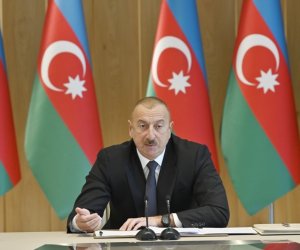
Political News
18:48
Azerbaijani President: By burning our flag, Armenians only showed their ugly qualities to the whole world
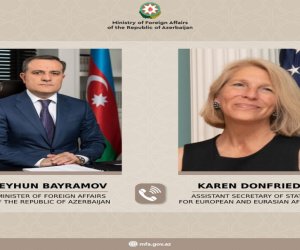
Political News
10:30
Azerbaijani FM, US Assistant Secretary of State discuss peace process between Azerbaijan and Armenia
Latest news 
More news 

























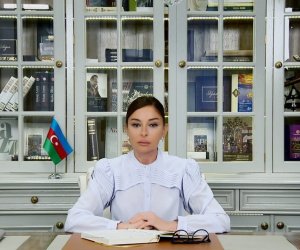
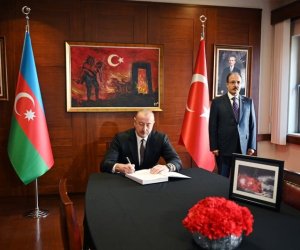
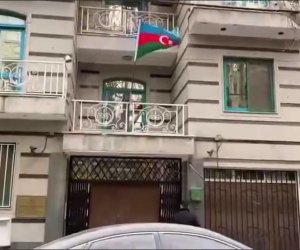
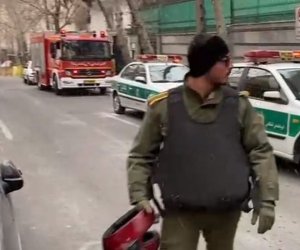
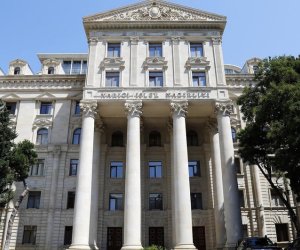
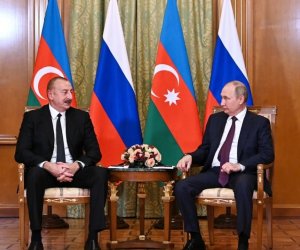


 Photo
Photo 



 Video
Video 

